Simple appeal on stage
Updated: 2013-10-06 07:05
By Chen Nan (China Daily)
|
||||||||
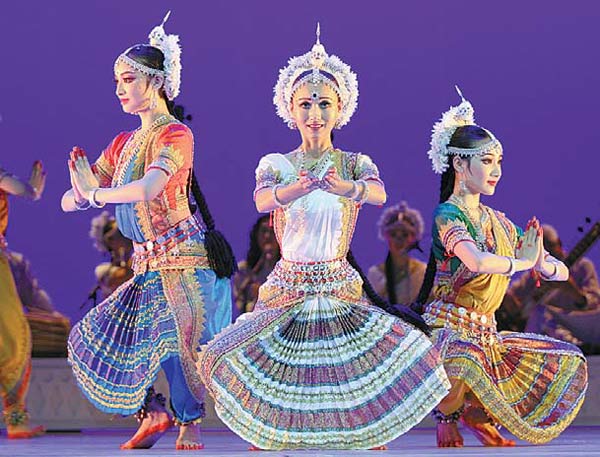 |
|
The Indian dance was part of the show, Neighbors, that proved simple sets can be effective. ZOU HONG / CHINA DAILY |
Stage designers love the extravaganza of light and sound, but for one, it is simplicity that speaks loudest, and it's all thanks to an austerity drive. Chen Nan finds out more.
For Sheng Xiaoying, an art designer from China Oriental Performing Art Group, his latest challenge is a multi-national production that brings together dances from six countries, including India, Spain, South Korea and China.
The 90-minute show, Neighbors, has a total cast of only 17, making it a relatively modest production compared with Sheng's past efforts, usually shows with extravagant stage sets and lighting with big name stars to attract eyeballs.
But Neighbors would be different.
"The focus is on the actors, their dances and music, which the production revolves around. I didn't want the stage sets or dazzling lights to overshadow their performance," Sheng says. And he's done it.
When the Indian dancer walked to the stage from the audience seats, four performers were playing traditional Indian instruments and chanting old Indian folk songs on the stage against a stark white arch as the only backdrop.
It was the dancer the audience focused on and they applauded him warmly right to the last minute.
Neighbors, which was shown on Aug 31 in Beijing, was the first show that China Oriental Performing Art Group made after the Publicity Department of the Communist Party of China Central Committee, ordered art troupes to restrict gala expenses and arrangements.
According to Gu Xin, CEO of China Oriental Performing Art Group, the number of actors was half that of other shows. The expenses of stage design and costumes were also largely frugal.
But, Gu adds that the quality of the show was not compromised by cost-cutting, with the actors rehearsing 12 hours a day since June.
"The success of the show made us confident. The biggest selling point is still the actors. We want to take audiences back to the theater for the show itself rather than the big investment, expansive promotions or luxurious stage sets," Gu says.
"The government's austerity effort is an opportunity for national art troupes like us," he continues.
In the past, the troupe produced galas for the sake of recognition from leaders or for catering to market demands for celebrity draws and big-budget designs, which deviated from the real art.
Now they get the opportunity to return to the basics of the art.
Though the government-sponsored shows have been reduced, the market is still growing because high quality shows with artistic value attract investors from performance companies.
According to Gu, Neighbors was scheduled to be staged on Oct 3 at the Great Hall of the People and after that, it will tour the country with over 100 performances planned, all supported and sponsored by performance companies.
"It will guarantee the income of the actors," he says. He also points out that saving show expenses benefits audiences as ticket prices can be reduced by about 50 percent.
"Audiences want to watch talented dances and listen to beautiful music instead of seeing impressive lighting arrangements. I believe the austerity effort will take more audiences back to the theater, which is sustainable and healthy for the performance market," he says.
But the economic impact of the austerity drive is still there.
Earnings of some artistic troupes and companies, theatrical design companies in particular, have dropped sharply, Culture Minister Cai Wu had said in an earlier interview.
He was referring to figures cited in the Report on China's Performing Market 2013.
According to Cai, nearly 3 million yuan have been saved during the 2013 China National Art Troup Performance Festival, in which 9 national art troupes participated.
"The cost-cutting order helps China's performance market head towards a healthy direction and connect the national art troupes with market demands," he said.
"It's a win-win situation," says Wei Yinjiu, general secretary from China Opera and Dance Drama Theater. "We have canceled some shows to save cost. All the costumes, stage installments and decorations we use are recycled. We also avoid big spending by inviting celebrities."
He also says that without those extra shows, the creative teams now have more time on research and creating art which is closer to audiences.
Confucius, an original musical and dance show made by China Opera and Dance Drama Theater, was premiered at the National Center for Performing Arts in Beijing during the 2013 China National Art Troup Performance Festival.
The three-day show was sold out and it has been invited abroad.
"There is nothing better than running the theater by touring regularly and connecting with the market," Wei says.
The Singing and Dancing Troupe of Jilin city, Jilin province, used to perform at various national galas, including the CCTV Spring Festival Gala, the highest rated show on TV every year.
According to the director of the Troupe, Lan Jinglong, they used to have more than 150 shows every year. After the central government slapped down the frugality order, the number of performances has been reduced by around 40 percent.
"Though the financial support from the government has been reduced, we are confident we could make our own shows," says Lan. "Our main plan is tour the country and perform abroad."
Besides theater, TV shows used to attract high viewing rates with extravagant stage designs and big name stars.
The State General Administration of Press, Publication, Radio, Film and Television said in a statement that "TV galas should focus on spiritual and aesthetic enrichment; ostentation and sensationalism must be avoided."
It also encouraged TV stations to "increase the opportunities for ordinary members from the public to participate in galas and cut the time and funds lavished on entertainers and stars."
According to Xinhua News Agency, China Central Television (CCTV) severely cut its cast for the annual Mid-Autumn Festival gala, while major local TV stations canceled shows, including Jiangsu Satellite TV Station, Zhejiang Satellite TV Station and Hunan Satellite TV Station.
"It will stimulate TV producers to focus more on form and content rather than depend solely on celebrity draws to attract eyeballs," says Qiu Hongwei from Zhejiang Satellite TV Station, according to Xinhua New Agency.
Contact the writer at chennan@chinadaily.com.cn.
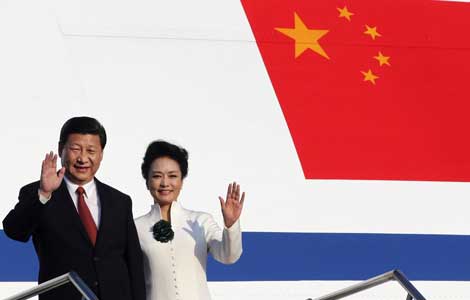
 President Xi arrives in Bali island for APEC meeting
President Xi arrives in Bali island for APEC meeting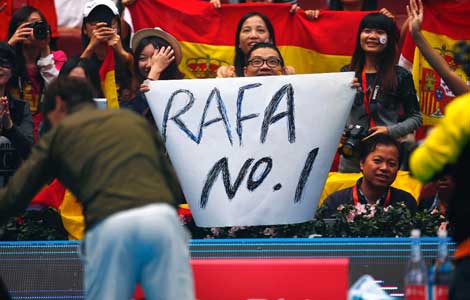
 Nadal to be No. 1 after reaching China Open final
Nadal to be No. 1 after reaching China Open final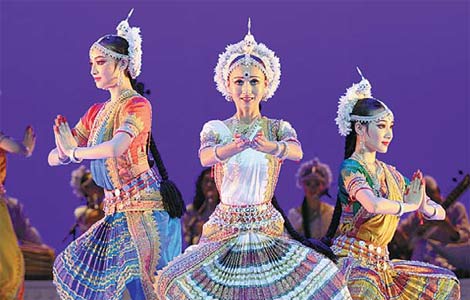
 Simple appeal on stage
Simple appeal on stage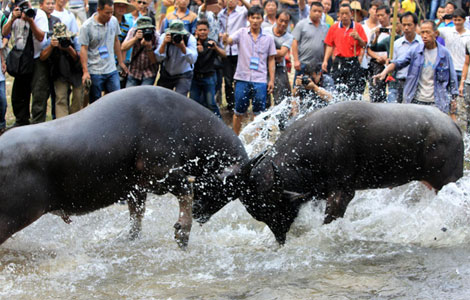
 Travel highlights during Golden Week
Travel highlights during Golden Week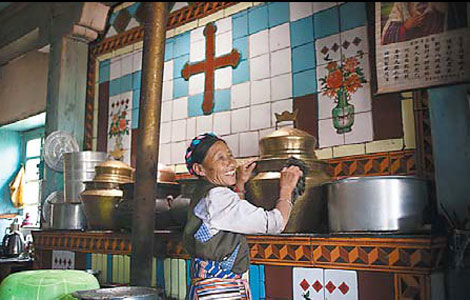
 Catholic conclave abides in Tibetan village
Catholic conclave abides in Tibetan village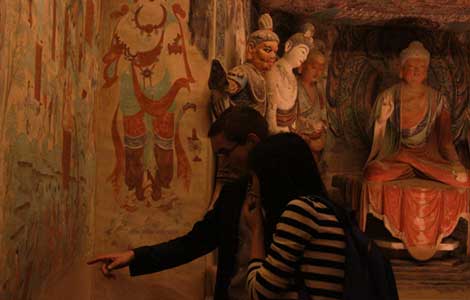
 Buddhist Art at the gateway of the Silk Road
Buddhist Art at the gateway of the Silk Road Embracing innovation
Embracing innovation
 Search for a cup holder's identity
Search for a cup holder's identity
Most Viewed
Editor's Picks

|

|

|

|

|

|
Today's Top News
S. China Sea typhoon death toll rises to 10
US forces take al-Qaida leader in Libya
Beijing to replace coal-fired power plants
Low number of migrant workers have insurance
78 killed, 166 wounded in attacks across Iraq
Iran is 'a year or more' away from nuke weapon
US govt workers to be paid
'Golden Week' losing its luster
US Weekly

|

|






